Welcome to Flash Pulp, episode two hundred and ninety-four.
 Tonight we present Coffin: Change
Tonight we present Coffin: Change
[audio:http://traffic.libsyn.com/skinner/FlashPulp294.mp3]Download MP3
(RSS / iTunes)
This week’s episodes are brought to you by Nutty Bites.
Flash Pulp is an experiment in broadcasting fresh pulp stories in the modern age – three to ten minutes of fiction brought to you Monday, Wednesday and Friday evenings.
Tonight, Coffin and Bunny face a powerful arcane force, and find themselves in a changing climate.
Written by J.R.D. Skinner
Art and Narration by Opopanax
and Audio produced by Jessica May
The winding road home had lead Will Coffin, urban shaman, and Bunny, his tipsy companion, to a Motel 6 a mere five hours from Capital City. Hurricane rains and fearsome wind had made continuing on an unpleasant prospect, and Coffin had nosed the rented Nissan into the lot only half certain that the neon smudge beyond the river on his windshield actually indicated lodging.
He was happy enough to cut the engine and not have to fight the storm for his life any longer – the confirmation of a vacancy sign was nearly just frosting on his fully-stopped cake.
“What a ####in’ dump,” said Bunny. “Still, I’d rather not drown in a parking lot. Let’s get inside.”
After a quick exchange at the faux-wood front desk, and a coin toss for who would bunk on the folding cot, the pair settled for the night. Coffin had spent the trip sleeping in a variety of ragged jeans and t-shirts, and tonight was no different. His lack of wardrobe changes meant that, while Bunny ducked into the bathroom to change, he was first grab the remote.
He’d found The Weather Channel by the time she exited in her oversized pin-striped pajamas.
“The Weather Channel?” she asked, “Better yet, The Weather Channel on mute? Christ, here comes the party – should I call for some champagne from the con-see-urge?”
“The what?” he replied.
“The Con-see-arg? The conc – whatever: The ####ing bottle boy, not that this place has anything more than a counter jockey with an already opened fifth of watered-down vodka under the counter. Way to ruin a solid goddamn joke.”
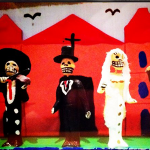 Without breaking away from the swirl of gray and red, Coffin said, “yeah, The Weather Channel.”
Without breaking away from the swirl of gray and red, Coffin said, “yeah, The Weather Channel.”
“It’s raining outside – you know how I know? Because it’s been raining for the last five ####ing hours. How about you give me the remote and you can, you know, look out a ####ing window. That way we’ll both be happy.”
Will finally shifted to eye his companion. Something about the woman had changed since they’d turned eastward, but he’d been too preoccupied to put his finger on it. She was peevish, but it was not her usual hangover fury.
“I stopped taking suggestions from women dressed like you when I was ten and told my senile grandmother I wasn’t going to eat any more of her still-frozen peas,” he replied. “Why did you buy that senior home suit, anyhow? Usually you just pass out in – wait, are you sober?”
Bunny’s cheeks grew red, and she suddenly became extremely interested in the close-cropped green carpet.
“I’m not ####ing quitting or anything,” she said. “I’ve never been in need of any ###damn church basements – I’m only, uh, taking it easy for a bit.”
Bunny’s gaze came up as she finished, so that she could clearly see his reaction. Her fists clenched in preparation for a smirk.
Instead, Coffin nodded, letting the moment sink to silence.
When she began to fuss with the folded blankets on her cot, he changed the topic to the weather.
“See this tracking map? Anything seem weird about the storm’s path?”
“Looks like any two-year-old’s scribbling. It’s a mess of loops with a randomly straight line.”
“Exactly. The scrawl is saying the forecasters are blaming sudden wind changes, but the guy they keep cutting to at the desk looks like he thinks a pack of teenage hooligans are feeding him bad meteorological data.”
“So?”
“So I think our night’s not done. There’s too much property damage and too many lost lives.”
“You’re going to go help people bail out their cellars and maybe save some kittens in trees while you’re at it?”
He stood from the bed. “I’m going to deal with the problem directly.”
“You plan on punching a ####ing hurricane?”
“No, I plan on reasoning with it.” He stooped to lace his boots, then added “ – hopefully.”
* * *
Despite the heart of the storm lying further north, each step was a fight for footing as the duo crossed the small beach’s parking lot.
Will was saying, “What is it? Well, squalls are a symptom common to a number of beasties, but most of them I’ve only ever read about – it could be the Tempestwalker, but I’ve never met it, I only know about it from Blackhall’s book and the occasional rumour. It could be even be one of the old thunder chuckers – Thor, Perun, or Set – though my understanding is that they’re all dead.”
“My mom always used to say storms were God bowling,” Bunny shouted into the rain. “The thunder was supposed to be the big guy getting strikes.”
She regretted the comment, as even the brief statement had covered her tongue with blown sand and seawater.
From behind the damp white motel towel that Coffin had absconded with, he said, “I’d say this is probably one of the elementals – specifically water, or Merc, as he was introduced to me. Mostly because I know for sure he exists.”
“He?”
“Sorry, just a leftover from the Victorian-era literature. It. Although, personality-wise – well, it’s an approximation.
“The problem is that Merc really shouldn’t be able to do this. It hasn’t had this kind of power since before -” a gust of wind carrying the sound of shattering glass somewhere in the dark over his left shoulder gave Will a moment to reconsider his words. “Actually, the problem with Merc is that he’s incredibly old school.”
”It,” said Bunny. “It’s incredibly old school. If it’s, uh, even it.”
Will raised a brow at his unusually sober companion. “Yeah. Exactly. Speaking of, time to cast a line and see what we catch.”
The silver links of the chain affixed to the Crook of Ortez dripped from Will’s jacket pocket as he plucked the talisman from its place of safekeeping. With a stiff arm, Coffin began to swing the ornate hook high over his head. Though the gale only grew, he kept the rhythm of his orbit for three long minutes before Merc appeared.
Bunny’s first thought was that a tornado funnel was setting down – she’d seen many of the coiling fingers in grainy footage from Discovery Channel storm chaser specials – but even as the rain abated in a narrow cone around their position on the shore, the billowing throng halted its descent.
Its details were half cloud, half shadow, but, a face, of inhuman proportions, formed a hundred feet above them.
Coffin ceased his rotations.
“If I saw this #### on the Internet,” said Bunny, “I’d think it was the work of some CGI-hoaxing keyboard molester.”
“Quiet now,” said Will, “things are about to get stupid enough as it is.”
The sound of Merc’s words arrived as if carried on a combination of crashing waves and surging wind,
“You’ve a new wench then? I suppose you had to get rid of the last one, considering how lippy she was.”
As he spoke, Bunny noted that the thunderheads which formed his mouth did not move. Instead, the darkness at their edges seemed to ripple with his speech, providing a semblance of motion.”
“Oh,” answered Coffin, “she’s around.”
“Not a great move on the part of you penis-wagglers to start letting them talk in public,” continued the elemental. Despite the dramatic method of its delivery, Bunny thought the entity sounded much like an opinionated uncle with no verbal filter.
Will cleared his throat. “If I’d known you were going to show up I wouldn’t have spent the last while driving across the country to check my thermometer.”
“The ogre still lives? May miracles never cease – and by miracles, I really mean me.”
“Yeah, it’s worryingly awake – and now I find you here, practically on my back stoop. At least the beast of the mountain is a mindless creature. You should know better than to show off like this. The more you carry on, the closer the Spider-God gets.”
“Sheriff, Sheriff, the idea that magic brings Kar’Wick closer to our world is a myth. A boogey cooked up by your funny-hatted predecessor.”
Coffin squinted at the massive visage before asking, “Blackhall wore a hat?”
“It was the same one every time I saw him. Actually, the same tattered coat as well.”
“Huh. Anyhow, back to my point: The last time I saw you, you couldn’t so much as cause a drizzle outside of your Bermudan home. Unless I’m mistaken, and I doubt I am, you haven’t been this far north in nearly two-hundred years.
“You can doubt old man Thomas if you like, but open your misty eyes: You can’t deny that there’s something odd going on. I’ve seen the results. Hell, I’m seeing you right now.”
“Arcane power is cyclical, that’s all,” replied Merc. “Any threat of nearing disaster is a false conspiracy cooked up by Blackhall, who simply wanted to wipe the occult from the world. You, the Coffin, should know that better than any else.”
Bunny shrugged within her damp jacket.
“You know,” she said, “I thought it was pretty nifty meeting the weather and ####, but you’re as thick headed as my ex-husband. Which is to say, he was pretty ####ing sure nothing could hurt him until a cleaver landed in his skull.
“Sounds like you weren’t much of a fan of this dead guy, Drywall or whatever, but do you have any reason to not believe him other than the fact that you don’t like him?”
Merc frowned.
“Your bitch is yapping,” it said, “where’s its leash?”
Coffin’s jaw was locked tight as he responded. “Listen, you can spout conspiracy nonsense if you like – hell, you can claim to have assassinated JFK for all I care – but this antiquated garbage you’re speaking isn’t winning you any friends.
“Go home, and quietly, or you’ll wish you’d had the chance to spend the next two hundred years tickling kites and dispersing flatulence.
“You may mock me, my title, or my mentor, but you WILL respect my neophyte.”
Thunder rolled, the rain returned, and Merc’s features loomed close.
Will’s fingers once again entangled in the silver chain.
“Come then,” he replied, “and learn the hard way.”
At the sight of the charm, the elemental’s fury-lit eyes seemed to reconsider. As if no more threat than a draft of pipe smoke, its own wind dispersed its form over the white-capped water.
After a moment of staring down the calming ocean, Will started back to their room with heavy boots and stooped shoulders. Three steps into his exit, however, he turned to his companion.
A hint of a smirk touched his lips as he said, “good job.”
By the time the pair found their numbered door, even the drizzle had ceased.
Flash Pulp is presented by http://skinner.fm, and is released under the Canadian Creative Commons Attribution-Noncommercial 2.5 License.
Freesound.org credits:
rbh thunder_03.wav by RHumphries
rbh thunder storm.wav by RHumphries
oceanwavescrushing.wav by Luftrum
Text and audio commentaries can be sent to comments@flashpulp.com – but be aware that it may appear in the FlashCast.
– and thanks to you, for reading. If you enjoyed the story, tell your friends.
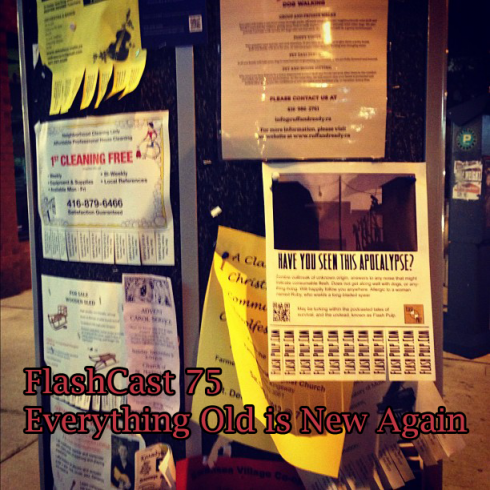
 “One night, a couple years in, when she really couldn’t get up anymore, she managed to twist herself into lying on top of the tube for her pee-bag, and I wasn’t able to roll her over. She was kind of panicking – she was still mostly speaking then – and it got me upset, and I was trying to shove her over, but I wasn’t strong enough do it.
“One night, a couple years in, when she really couldn’t get up anymore, she managed to twist herself into lying on top of the tube for her pee-bag, and I wasn’t able to roll her over. She was kind of panicking – she was still mostly speaking then – and it got me upset, and I was trying to shove her over, but I wasn’t strong enough do it. Now, I should clarify, it wasn’t as if I was strolling about like a grandmother on her way back from Sunday service. The madness of Hitchcock’s Disease had fully gripped my mind by then, and I managed forward momentum only through slow progress and carefully affected casualness.
Now, I should clarify, it wasn’t as if I was strolling about like a grandmother on her way back from Sunday service. The madness of Hitchcock’s Disease had fully gripped my mind by then, and I managed forward momentum only through slow progress and carefully affected casualness. Without breaking away from the swirl of gray and red, Coffin said, “yeah, The Weather Channel.”
Without breaking away from the swirl of gray and red, Coffin said, “yeah, The Weather Channel.”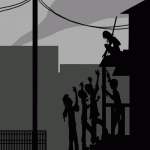
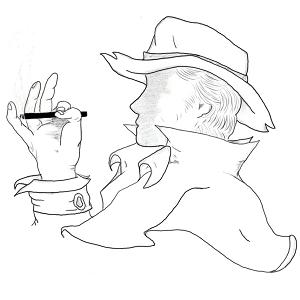 An hour passed, then two, and yet, despite the night’s arrival, a pregnant moon rose through the spent clouds, offering a small boon to ease Thomas’ chilled frustrations.
An hour passed, then two, and yet, despite the night’s arrival, a pregnant moon rose through the spent clouds, offering a small boon to ease Thomas’ chilled frustrations.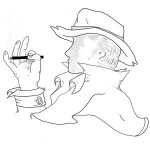 Mistaking the source of James’ agitation, she said, in her sweetest tone, “have no worries, any fellow with that much drink in his belly will likely spend the second half of the journey in unconsciousness.”
Mistaking the source of James’ agitation, she said, in her sweetest tone, “have no worries, any fellow with that much drink in his belly will likely spend the second half of the journey in unconsciousness.”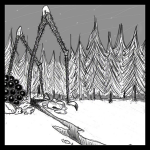 Simultaneously, the newsman felt a rumble in his sneaker soles, as if a large truck were idling just beneath the floor tiles.
Simultaneously, the newsman felt a rumble in his sneaker soles, as if a large truck were idling just beneath the floor tiles. “Yeah, but four dudes?” Billy was saying.
“Yeah, but four dudes?” Billy was saying.